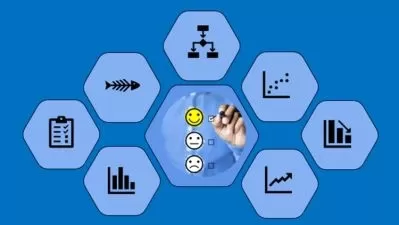Unlock Certified Quality Engineer (CQE) Strategies
Raheem ace
1:57:52
Description
CQE Success: Leadership Tools, Techniques for Quality Excellence, Guide to Quality Control and Assurance Essentials.
What You'll Learn?
- A comprehensive understanding of quality management systems (QMS) and their role in ensuring product and process consistency.
- Key leadership skills and team management techniques necessary for quality engineers, along with strategies for effective change management in quality systems.
- even Basic Quality Tools, Six Sigma, Failure Mode and Effects Analysis (FMEA), and Design of Experiments (DOE).
- Techniques for ensuring product design quality, improving process design using Lean and Six Sigma, and applying Statistical Process Control (SPC).
- Differences between quality control (QC) and quality assurance (QA), methods of inspection and testing, and how to conduct quality audits.
- Understanding risk management in quality systems, focusing on proactive tools like FMEA and risk-based thinking.
- How to assess, qualify, and manage supplier quality, ensuring long-term supplier partnerships and consistent product quality.
- Principles of reliability engineering, product lifecycle management, and reliability testing methods to ensure product longevity and customer satisfaction.
- and much more
Who is this for?
What You Need to Know?
More details
Description|| UNOFFICIALÂ COURSE ||
IMPORTANT before enrolling:
This course is designed to complement your preparation for certification exams, but it is not a substitute for official vendor materials. It is not endorsed by the certification vendor, and you will not receive the official certification study material or a voucher as part of this course.
This Certified Quality Engineer (CQE) course is designed to equip professionals with the knowledge and skills required to excel in the field of quality engineering. Whether you’re preparing for the CQE exam or seeking to enhance your expertise in quality management, this comprehensive course covers everything you need to know about maintaining and improving product and process quality.
Certified Quality Engineer (CQE) is a professional who specializes in managing, developing, and maintaining the quality of products and processes within an organization.
I begin by introducing the CQE certification, outlining its importance for quality professionals, and detailing the career benefits it offers. You will gain a deep understanding of Quality Management Systems (QMS) and how these systems play a crucial role in ensuring consistent product quality. Through practical examples and real-world applications, you’ll see how QMS integrates into the larger framework of business strategy.
Leadership plays a key role in quality management, and this course will guide you through the responsibilities and skills required of a quality engineer. We’ll explore the principles of effective team management and leadership, showing how you can lead your team toward successful quality outcomes. You’ll also learn how to manage change within quality systems to ensure minimal disruption and maximize efficiency.
The course dives into the essential tools and techniques for quality planning and strategic development. You’ll discover how to create a robust quality plan that aligns with organizational goals, and you’ll explore both basic and advanced quality tools, such as the Seven Basic Quality Tools, Six Sigma, Failure Modes and Effects Analysis (FMEA), and Design of Experiments (DOE). These tools are fundamental in problem-solving and ensuring process improvements.
Quality engineers play a vital role in both product and process design, and this course will highlight how quality engineering impacts product conformity. We’ll also cover process improvement methodologies like Lean and Six Sigma, providing insight into how they help organizations achieve efficiency and consistent quality. Statistical Process Control (SPC) will be introduced as a key method for maintaining process stability, and you’ll learn about process capability analysis to measure and enhance process performance.
A solid understanding of quality control and assurance is crucial for any quality engineer. In this course, you’ll explore the fundamentals of quality control, the differences between quality control (QC) and quality assurance (QA), and how inspection and testing play a role in maintaining high-quality standards. You’ll also learn about quality audits, compliance with industry standards, root cause analysis (RCA), and the importance of corrective and preventive actions (CAPA) to eliminate non-conformances.
Risk management is another core component of the CQE certification. You will explore risk management techniques and how to apply them in quality processes to reduce variability and ensure consistent outcomes. We’ll take a deep dive into Failure Mode and Effects Analysis (FMEA) and risk-based thinking as required by ISO 9001:2015, focusing on proactive quality management to identify and mitigate potential risks before they impact production.
Supply chain quality management is integral to product quality, and this course will teach you how to evaluate and manage supplier quality through audits, qualifications, and certifications. You’ll also discover how to develop strong, long-term relationships with suppliers while ensuring they meet the highest quality standards.
Finally, we’ll explore the fields of reliability and maintainability. This section will introduce you to reliability engineering and its importance in extending product lifecycles and customer satisfaction. You’ll learn about maintainability and its impact on product lifecycle cost-effectiveness, as well as methods for conducting reliability testing and analysis, including techniques such as accelerated life testing and Weibull analysis.
CQE exam covers topics such as quality management systems, product and process design, control and improvement, reliability and maintainability, and risk management. The certification is suitable for professionals in quality engineering, quality management, or those looking to develop a deeper understanding of quality assurance practices.
This course is ideal for those seeking to become Certified Quality Engineers, professionals looking to advance their careers in quality management, or anyone interested in learning the tools and techniques for ensuring product and process quality.
This course will provide you with the expertise and confidence to succeed in the quality engineering field.
Thank you
Who this course is for:
- Aspiring Quality Engineers: Professionals looking to gain the knowledge and skills required to earn the CQE certification and advance their careers in quality engineering.
- Current Quality Professionals: Individuals already working in quality management, control, or assurance roles who want to enhance their expertise and stay up-to-date with the latest tools, techniques, and industry standards.
- Manufacturing and Process Engineers: Engineers involved in product and process design, who want to learn how quality engineering principles can improve efficiency and ensure product consistency.
- Managers and Team Leaders in Quality: Those responsible for leading teams in quality-related functions, looking to strengthen their leadership skills and effectively manage quality processes.
- Professionals in Industries Focused on Quality: Individuals working in industries such as manufacturing, healthcare, logistics, automotive, aerospace, or any sector that requires stringent quality standards.
- CQE Exam Candidates: Those preparing for the ASQ Certified Quality Engineer exam who want a comprehensive and structured course to support their exam readiness.
- This course is ideal for anyone committed to advancing their career in quality management and seeking to build a strong foundation in quality engineering principles.
|| UNOFFICIALÂ COURSE ||
IMPORTANT before enrolling:
This course is designed to complement your preparation for certification exams, but it is not a substitute for official vendor materials. It is not endorsed by the certification vendor, and you will not receive the official certification study material or a voucher as part of this course.
This Certified Quality Engineer (CQE) course is designed to equip professionals with the knowledge and skills required to excel in the field of quality engineering. Whether you’re preparing for the CQE exam or seeking to enhance your expertise in quality management, this comprehensive course covers everything you need to know about maintaining and improving product and process quality.
Certified Quality Engineer (CQE) is a professional who specializes in managing, developing, and maintaining the quality of products and processes within an organization.
I begin by introducing the CQE certification, outlining its importance for quality professionals, and detailing the career benefits it offers. You will gain a deep understanding of Quality Management Systems (QMS) and how these systems play a crucial role in ensuring consistent product quality. Through practical examples and real-world applications, you’ll see how QMS integrates into the larger framework of business strategy.
Leadership plays a key role in quality management, and this course will guide you through the responsibilities and skills required of a quality engineer. We’ll explore the principles of effective team management and leadership, showing how you can lead your team toward successful quality outcomes. You’ll also learn how to manage change within quality systems to ensure minimal disruption and maximize efficiency.
The course dives into the essential tools and techniques for quality planning and strategic development. You’ll discover how to create a robust quality plan that aligns with organizational goals, and you’ll explore both basic and advanced quality tools, such as the Seven Basic Quality Tools, Six Sigma, Failure Modes and Effects Analysis (FMEA), and Design of Experiments (DOE). These tools are fundamental in problem-solving and ensuring process improvements.
Quality engineers play a vital role in both product and process design, and this course will highlight how quality engineering impacts product conformity. We’ll also cover process improvement methodologies like Lean and Six Sigma, providing insight into how they help organizations achieve efficiency and consistent quality. Statistical Process Control (SPC) will be introduced as a key method for maintaining process stability, and you’ll learn about process capability analysis to measure and enhance process performance.
A solid understanding of quality control and assurance is crucial for any quality engineer. In this course, you’ll explore the fundamentals of quality control, the differences between quality control (QC) and quality assurance (QA), and how inspection and testing play a role in maintaining high-quality standards. You’ll also learn about quality audits, compliance with industry standards, root cause analysis (RCA), and the importance of corrective and preventive actions (CAPA) to eliminate non-conformances.
Risk management is another core component of the CQE certification. You will explore risk management techniques and how to apply them in quality processes to reduce variability and ensure consistent outcomes. We’ll take a deep dive into Failure Mode and Effects Analysis (FMEA) and risk-based thinking as required by ISO 9001:2015, focusing on proactive quality management to identify and mitigate potential risks before they impact production.
Supply chain quality management is integral to product quality, and this course will teach you how to evaluate and manage supplier quality through audits, qualifications, and certifications. You’ll also discover how to develop strong, long-term relationships with suppliers while ensuring they meet the highest quality standards.
Finally, we’ll explore the fields of reliability and maintainability. This section will introduce you to reliability engineering and its importance in extending product lifecycles and customer satisfaction. You’ll learn about maintainability and its impact on product lifecycle cost-effectiveness, as well as methods for conducting reliability testing and analysis, including techniques such as accelerated life testing and Weibull analysis.
CQE exam covers topics such as quality management systems, product and process design, control and improvement, reliability and maintainability, and risk management. The certification is suitable for professionals in quality engineering, quality management, or those looking to develop a deeper understanding of quality assurance practices.
This course is ideal for those seeking to become Certified Quality Engineers, professionals looking to advance their careers in quality management, or anyone interested in learning the tools and techniques for ensuring product and process quality.
This course will provide you with the expertise and confidence to succeed in the quality engineering field.
Thank you
Who this course is for:
- Aspiring Quality Engineers: Professionals looking to gain the knowledge and skills required to earn the CQE certification and advance their careers in quality engineering.
- Current Quality Professionals: Individuals already working in quality management, control, or assurance roles who want to enhance their expertise and stay up-to-date with the latest tools, techniques, and industry standards.
- Manufacturing and Process Engineers: Engineers involved in product and process design, who want to learn how quality engineering principles can improve efficiency and ensure product consistency.
- Managers and Team Leaders in Quality: Those responsible for leading teams in quality-related functions, looking to strengthen their leadership skills and effectively manage quality processes.
- Professionals in Industries Focused on Quality: Individuals working in industries such as manufacturing, healthcare, logistics, automotive, aerospace, or any sector that requires stringent quality standards.
- CQE Exam Candidates: Those preparing for the ASQ Certified Quality Engineer exam who want a comprehensive and structured course to support their exam readiness.
- This course is ideal for anyone committed to advancing their career in quality management and seeking to build a strong foundation in quality engineering principles.
User Reviews
Rating
Raheem ace
Instructor's Courses
Udemy
View courses Udemy- language english
- Training sessions 26
- duration 1:57:52
- Release Date 2025/03/06











